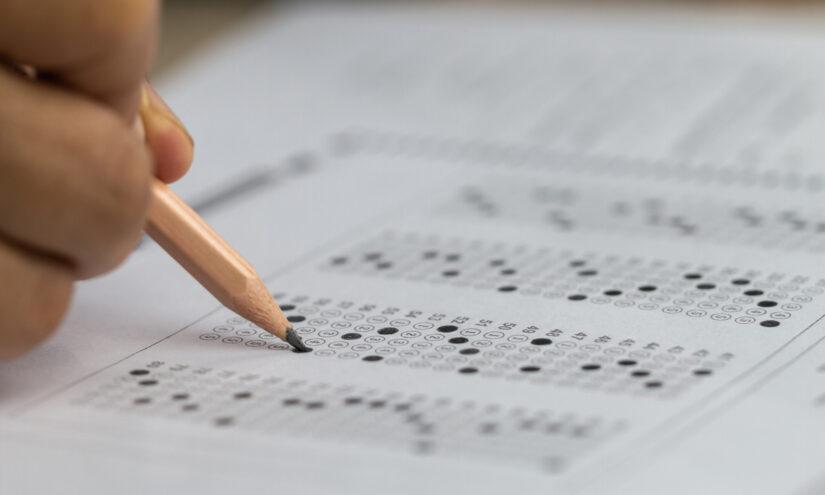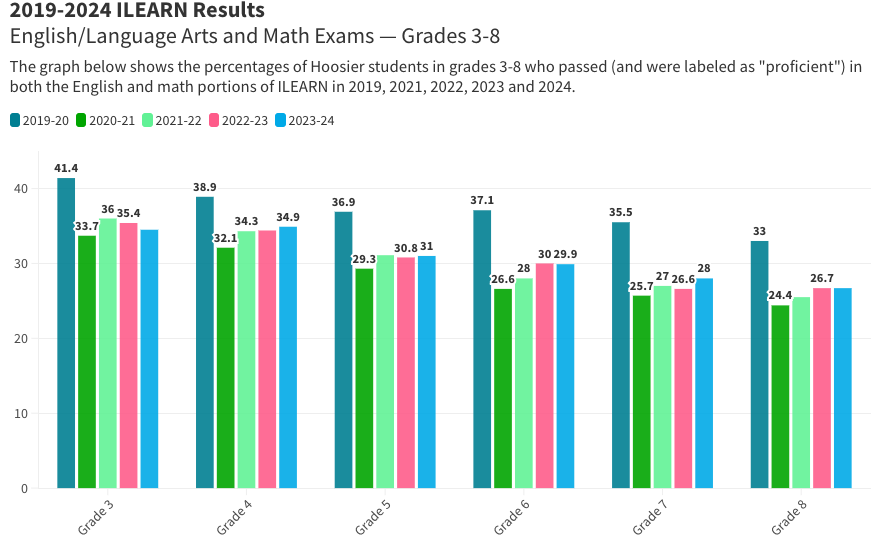Reflecting on the tenets that shape our educational practices is fundamental for …
Indiana’s ILEARN Test Scores Reveal Unchanged Student Progress in 2024
Carlos Changemaker

New results from the latest state standardized tests reveal little improvement in academic performance among Indiana students in grades 3-8, suggesting an ongoing challenge to combat the extensive learning setbacks stemming from the aftermath of the COVID-19 crisis.
Recent data from the Indiana Department of Education (IDOE) shows that 41% of tested students met or exceeded proficiency standards in English and language arts (ELA) on the ILEARN assessment conducted earlier this year. This figure remains consistent with last year’s results, where 40.7% demonstrated proficiency.
Conversely, the math proficiency rate saw a marginal decline, dropping from 40.9% in the prior year to 40.7% in the current academic term.
Notably, IDOE’s data highlights that 30.8% of Indiana students successfully cleared both the English and math sections of the ILEARN exam, representing a slight upturn from the previous year’s statistics where 30.6% achieved this dual achievement.
During the spring testing period, close to 493,000 students participated in both the English and math assessments.
Indiana Secretary of Education Katie Jenner remarked on the results, stating, “While there have been incremental gains in ELA and math proficiency in several grades over the past three years, we must maintain our efforts to ensure that all students possess a solid educational foundation to optimize their future prospects.”
Breakdown of Test Results
Comparisons with 2019 data indicate that current ILEARN scores continue to lag behind significantly, with 47.9% of students achieving passing scores in English and 47.8% in math that year. This was accompanied by a proficiency rate of 37.1% in both subjects.
Due to altered instructional methodologies following the disruptions caused by the pandemic in 2020, state authorities have adopted the 2021 ILEARN outcomes as the latest benchmark for Indiana’s educational standards.
When benchmarked against the 2021 data, proficiency in ELA has risen across various grade levels, showcasing fluctuations such as a minimal decline of 0.1% in third grade and more substantial gains in subsequent grades.

Officials from IDOE underscored that many students who were in third grade during the 2024 academic year encountered challenges due to virtual or hybrid learning experiences during kindergarten, contributing to decreased scholastic achievements.
Recent ILEARN data from 2024 indicates a moderate increase in English proficiency across various grade levels compared to the previous year, with notable progress in fourth and seventh grades.
Moreover, math proficiency has advanced across all grade levels since the 2021 baseline, albeit showing a decline in comparison to 2023 outcomes in most grade levels.
Introduced in 2019 as a replacement for the ISTEP assessment, ILEARN assesses proficiency in multiple subjects from third to eighth grade, focusing primarily on ELA and mathematics. Schools administer the test either in person or electronically, except in cases requiring special accommodations.
Following federal authorization, the assessment was not conducted in 2020 owing to the closure of schools prompted by the pandemic.
Analyzing Specific Student Demographics
Between 2023 and 2024, Black students exhibited the most notable improvement in English proficiency, with a 1.2% increase, alongside an 8% surge in math proficiency. Presently, 20.9% of Black students in Indiana attained ELA proficiency and 17% in math, with 11.7% achieving passing scores in both sections this year.

When compared to the 2021 baseline, Black students have witnessed a 3.5% rise in English proficiency and a 5.4% increase in math aptitude.
Reflecting on this data, Jenner highlighted the distinct progress made, emphasizing the importance of sustained enhancements in educational outcomes. However, Scott Bess, a prominent education figure in Indiana, cautioned that further accelerated progress remains imperative.

Additionally, proficiency rates for Hispanic students exhibited marginal declines in both English and math proficiency levels, while students in special education and those benefiting from free or reduced-price meals experienced modest improvements in academic performance from 2023 to 2024.
English learners, identified in 2021 as requiring targeted English support, observed a slight increase of 0.8% in the subject; however, additional assistance is deemed necessary for strengthening math proficiency, as indicated by a 0.3% decrease in the current assessment cycle. English learners demonstrated an ELA proficiency of 13.8% and a math proficiency of 17.6% during the recent testing period.
Upcoming Changes in Assessment
Against the backdrop of these results, efforts are underway to overhaul the ILEARN assessment framework by introducing the option for schools to divide the exam segments throughout the academic year.
The proposed redesign encompasses “flexible checkpoints,” enabling schools to administer preparatory assessments in English and math before the traditional end-of-year summative tests. This model, already adopted by a dozen other states, aims to provide real-time data to support student progress.
Opt-ins for the pilot program of ILEARN checkpoints for the upcoming academic year indicate a 72% participation rate from Indiana schools, with the full-scale implementation slated for the subsequent school year.
Jenner and education officials emphasized the significance of these adjustments, asserting that the introduction of periodic assessments will enable timely intervention and targeted support for students, fostering continuous academic growth.
Furthermore, modified versions of the state’s IREAD tests, assessing foundational reading skills, are set to be introduced, with key changes requiring schools to conduct the statewide IREAD test in second grade instead of third, starting this academic year. Struggling students will receive specialized assistance, and retention measures will be enforced after multiple attempts to meet proficiency standards.
These updates signal an ongoing commitment to enhancing educational outcomes and providing tailored support to diverse student populations in Indiana.



